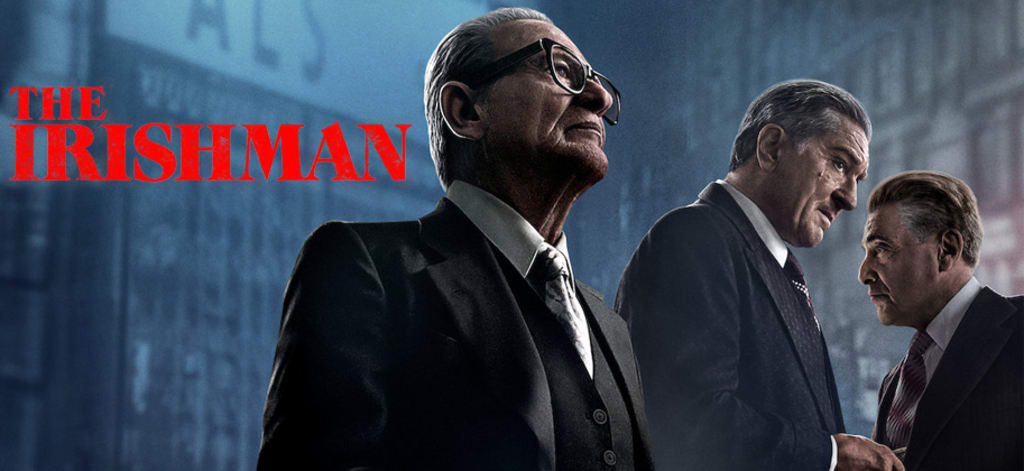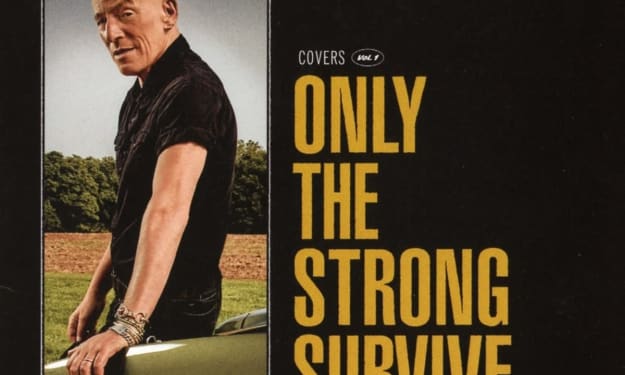'The Irishman' Quietly Takes Its Place in the Pantheon of Scorsese's Best Films
De Niro, Pacino and Pesci turn in their best work in decades.

The Irishman, Martin Scorsese's latest, has been described as his 'magnum opus.' It has been in development hell since at least 2004, but it wasn't until Netflix brought the rights to it in 2015 for an astronomical 159 million dollars, that the project finally took flight. It drew further attention by reuniting the legendary director with Robert De Niro and Joe Pesci for the first time since 1995's Casino, and more still with the addition of Al Pacino, who had never worked with Scorsese or Pesci before. This titanic assembly of talent built up a tidal wave of expectations for the finished product, and given Scorsese's remarkably consistent track record and reputation as arguably the greatest American director of all time, it was likely that the film would be on par with previous works such as Taxi Driver, Raging Bull, and Goodfellas.
Based on the book I Hear You Paint Houses by Charles Brandt, The Irishman tells the story of Frank Sheeran (De Niro), a local meat truck driver in 1950s Pennsylvania. Sheeran is a family man and an honest, hardworking man, until he meets local gangster Skinny Razor (Bobby Cannavale). Enticed by the extra money and lifestyle, Sheeran begins selling some of his company's products to Razor and his associates. One day, Sheeran opens his doors to a completely empty truck while on delivery and is accused of theft by his employers, only to bailed out by his shrewd union attorney, Bill Bufalino (Ray Romano). While at dinner one night, Bill formally introduces Frank to his cousin Russell (Joe Pesci), a powerful figure in Philadelphia organized crime. Russell and Frank immediately take a liking to each other; Frank begins working for Russell and local boss Angelo Bruno (Harvey Keitel, in a disappointingly small role).
As the mafia continues to gain power through their alliance with the International Brotherhood of Teamsters, the largest union in the United States, Sheeran is introduced to the IBT'S president, Jimmy Hoffa (Al Pacino). Sheeran is brought in as Hoffa's bodyguard and forms a close professional and personal relationship with him. Hoffa continues to bring in big money for both the union and the mob, and with the election of John F. Kennedy (whom Hoffa hated but who the mob supported), the potential for business to expand into Cuba is seen as a major windfall for both. However, attorney general and JFK's brother Robert Kennedy immediately forms a task force concentrated on taking down both Hoffa and the mafia, eventually crippling Hoffa's power and sending him to jail for several years for jury tampering and fraud.
Upon release, Hoffa's tense relationship with former friend and Genovese crime family capo regime Anthony "Tony Pro" Provenzano, creates an irreparable rift between himself and his former associates, including Russell and Jimmy. Hoffa is seen as past his prime as well as difficult to work with, and his constant attempts at getting back into power by overthrowing those favored by his past backers increasingly number his days, eventually resulting in perhaps the most famous unsolved mysteries of all time.
Those looking for a new Goodfellas, Casino, or even The Departed will not find it in The Irishman. Whereas each of those three films had live-wire energy, colorful characters and soundtrack choices, and hilariously quotable moments and lines, The Irishman has none of these. It's subtle, methodically paced, and focused strictly on the motivations of the characters. A lesser director would've created a subpar bore fest, but the quietly tense atmosphere Scorsese weaves harkens back to the pure character studies of his early career, such as Alice Doesn't Live Here Anymore and Taxi Driver.
De Niro and Pacino, long accused of having phoned it in and even becoming parodies of themselves, both turn in their best work since Heat. De Niro's Sheeran is at once likable and repulsive, sympathetic and offensive. He's a 'take no prisoners' tough guy and a conflicted family man whose relationship with his daughters is constantly in turmoil. He delights in his crimes and agonizes over his private life. He's a loyal friend and a vicious enemy. The one consistent character trait is his genuine and sincere devotion to Russell and Jimmy. De Niro nails these complexities and nuances with the same drive and passion he put into Travis Bickle and Jake La Motta, a performance from the finest vintage he can supply.
As Hoffa, Pacino plays a familiar archetype (loud, blustering and prone to extreme fits of rage), but given this is who Hoffa himself often was, it doesn't feel forced or over the top. This is a very dynamic performances, where Pacino builds up to his more explosive moments instead of lunging headfirst into 'raspy, screaming, cursing' mode. Pacino may not have to explore as many nuances and subtleties as De Niro, but as a pure piece of acting, it's excellent.
The real force of the film, however, is Pesci. As Buffalino, he is the complete opposite of Tommy De Vito and Nicky Santoro. Whereas those characters were certified psychopaths, Buffalino's menace comes from his frighteningly calm, soft spoken demeanor and calculated, carefully considered approach to doing business. He doesn't act on impulse and is not motivated by personal vendettas, he simply looks for the best solution and does everything he can to avoid bloodshed. Even when not on screen, Pesci's shadow haunts the film, as you know that whenever something goes down, he's preparing to strike. It's a chilling performance, and since this is likely Pesci's swan song as an actor, it's an unforgettable way to go out.
The film is beefed up further by a very strong supporting cast anchored by Keitel, Romano, Stephen Graham as Provenzano, Sebastian Maniscalco as "Crazy" Joe Gallo (a particularly inspired choice), Jesse Plemons as Hoffa's foster son Chuckie O'Brien, and Anna Paquin as the adult incarnation of Sheeran's oldest and most estranged daughter, Peggy, along with several other top notch talents playing a wide variety of colorful and eclectic personalities. Casting has always been one of the director's strongest touches, and he hits another home run here.
As a director, Scorsese has lost none of his magic, a master of using various angles, long shots, closeups, soundtrack choices, and other techniques to convey tension, emotion and character development like no other. His loyal editor, Thelma Schoonmaker, also deserves credit for the film's visual beauty. Even the controversial de-aging technique on De Niro works surprisingly well; it looks organic, and while he never quite looks 30 when Sheeran is supposed to be 30, it doesn't have that creepy 'uncanny valley' feel at all.
It takes an extremely critical lens to poke holes in the quality of The Irishman. Scoff at its length perhaps, but it definitely makes the most out of its sprawling run time. Few artists of any medium succeed at creating something in their winter years that's on par with their perceived peak, but The Irishman is a late day masterpiece whose impact will not dull anytime soon.
About the Creator
Anthony Nasti
Aspiring music journalist, occasional dreamer. Searching for the secret looking for the sound.





Comments
There are no comments for this story
Be the first to respond and start the conversation.